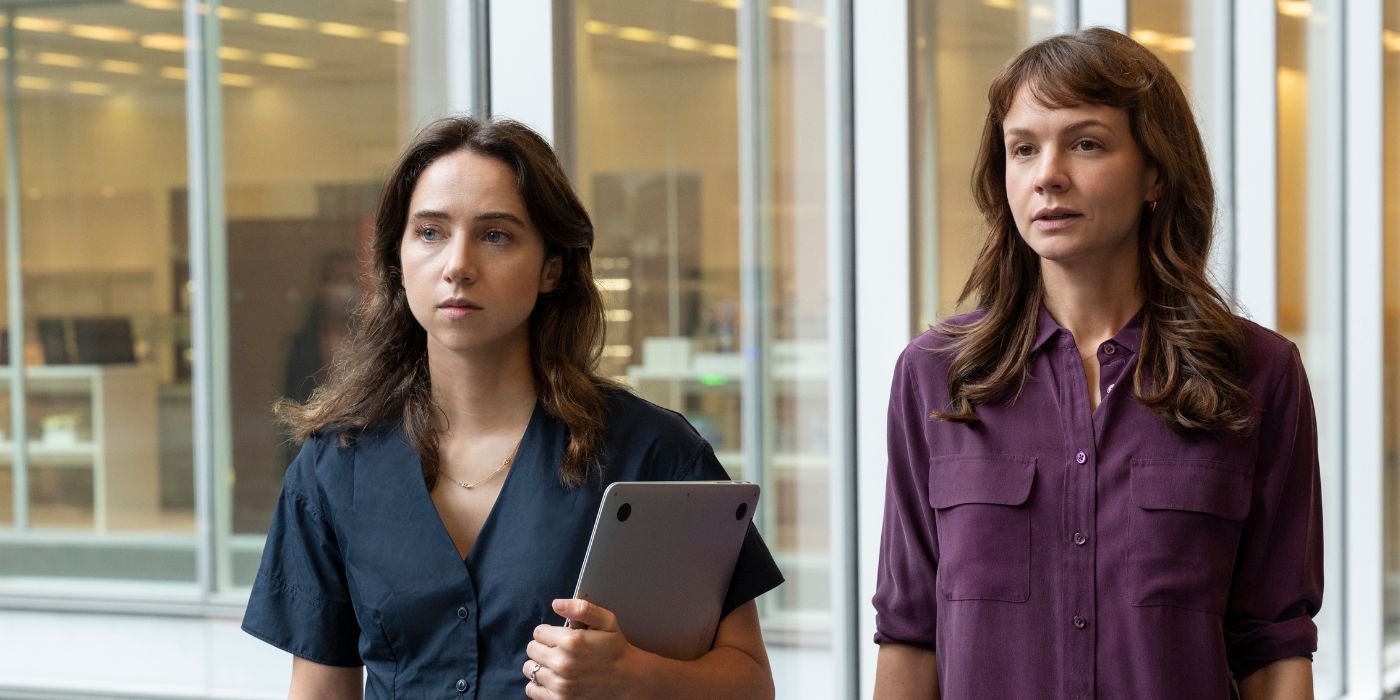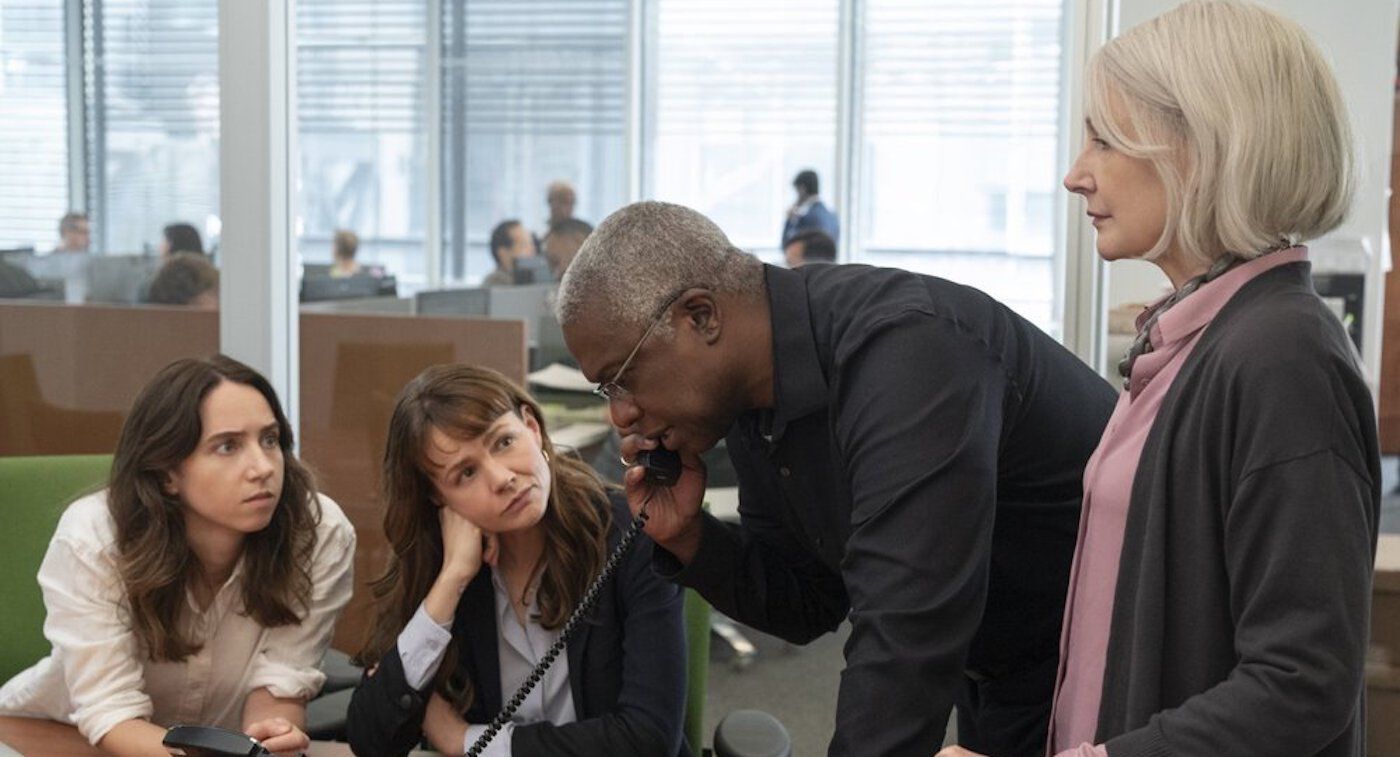Editor's Note: The following contains spoilers for She Said.With any film that tackles a recent news event or controversy, there is bound to be a heated discussion on whether or not it is too soon to be bringing the story to life. While films based on history have the potential to be instructive tools, they also need to be satisfying dramatic narratives in their own right. Taking a controversy ripped from the headlines doesn’t always work, but Maria Schrader’s journalistic thriller, She Said, justifies its existence. By paying tribute to classics within the political thriller genre, Schrader revamps the political paranoia of the 1970s from a modern perspective.
She Said tackles the New York Times investigation into allegations of sexual misconduct, assault, and abuse surrounding Harvey Weinstein and the subsequent “code of silence” within the industry. Investigative reporters Jodi Kantor (Zoe Kazan) and Megan Twohey (Carey Mulligan) discover that these crimes have been covered up for decades and that countless women have reported similar experiences. Jodi and Megan know that it’s important for these women to go on the record, but fear the repercussions they will face. This cycle of abuse and fear is what Jodi and Megan realize has allowed Weinstein and his cohorts to hide their open secret.
A 70s-Style Paranoid Thriller
While She Said features events, celebrities, and news articles that aren’t dated at all, it’s stylized like a classic “paranoid thriller” from the 1970s. In the aftermath of the Vietnam War, a series of political assassinations, and the Watergate scandal, Americans were more fearful than ever that there were shadowy forces conspiring against them. Many of the best films of this era were those that were either directly or indirectly inspired by recent events. She Said embodies these qualities by drawing a disturbing parallel between the corruption within the federal government to the influence of the entertainment industry. What does it say about our current society if entertainment conglomerates are just as powerful as governing bodies?
'She Said's Classic Influences
The most obvious film that She Said can be compared to is the 1974 classic All the President's Men, which follows The Washington Post reporters Carl Bernstein (Dustin Hoffman) and Bob Woodward (Robert Redford) as they uncover the Watergate scandal. She Said puts a similar emphasis on the importance of journalistic integrity and good reporting; Jodi and Megan are constantly double-checking their sources, calling to receive police records, and being specific in their phrasing in order to maintain ethical standards.
Both films show the difficulties that these journalists face as they try to keep their emotions out of the story; while Bernstein and Woodward had their political opinions, they did their best to keep their story unbiased and beyond factual reproach. Jodi and Megan face the same challenges, but it’s hard for them to hold back their righteous anger. Jodi is forced to have critical phone calls with victims, and she has to ask them questions that she knows aren’t fair. It’s cruel to ask these women to go on the record or explain why they didn’t report the crimes, but she has to do it for the sanctity of the story.
She Said also modernizes the concept by showing how the world of investigation has adjusted to new technology. In the same way that the titular character in Klute is constantly gazing at his police reports, Jodi can’t help but scan her laptop during dinner conversations with her husband. In fact, the persistence of old-school records within criminal cases is something that Megan grows infuriated by; in the Internet era, she doesn’t understand why some critical records are kept behind closed doors and not subject to her FOIA requests. She later discovers that these settlements and police reports were deliberately destroyed in order to erase evidence.
Schrader makes it clear from the beginning that this issue goes beyond the entertainment industry; Megan is insulted and threatened by both Donald Trump and Bill O’Reilly for her reports about their sexual misconduct. She’s shocked to find that the series of denials and threats that surround all of these men are indistinguishable. Whether it's politics, news, or film production, the issue is men in power are not being held accountable. A scene in which Jodi is followed by an unknown stalker strikes a haunting parallel to the anxiety that Harry Caul (Gene Hackman) feels in Francis Ford Coppola’s The Conversation.
Anxiety and Paranoia
In one of the film’s most obvious parallels to the work of Alan J. Pakula, Jodi meets with a source at a restaurant and realizes that they are being watched. It’s important for her to keep this meeting a secret, but there’s a crushing paranoia that her livelihood is in danger. It’s similar to the all-encompassing terror that the reporter Joseph Frady (Warren Beatty) faces in The Parallax View; once you’ve been marked as a “threat,” your name will be remembered.
One of the most striking elements of 1970s political thrillers was the idea of being unable to return to a normal life; an example is Three Days of the Condor, where the CIA analyst Joe Turner (Robert Redford) finds that he can’t even have intimate relations without being examined and judged by his enemies. Schrader explores this idea in more emotional detail; Megan struggles as a new mother, as she can’t even go to a doctor’s visit without receiving angry phone calls. While her husband, Jim Rutman (Tom Pelphrey), isn’t aggressive, he hints that his wife’s commitments to her duty have severely damaged their relationship.
Commitment to Telling the Truth
Schrader is also tactful in knowing what not to show. While celebrities and industry figures are occasionally name-dropped, most of them only have vocal roles and aren’t seen in full. You’ll note that Richard Nixon himself never appears in All the President’s Men. The exception is Ashley Judd, who appears as herself; this was certainly a risk, but it helped maintain the diligence to the truth that Schrader so obviously cares about. A story this important deserves a film that engages the audience; it would have been easy to turn these events into a generic work of awards bait, but Schrader delivers a stylized thriller that captures the dramatic potential. The emphasis on political paranoia from the 1970s isn’t just a directorial flare; it indicates that the world is still dealing with the same issues that were present 50 years ago.




